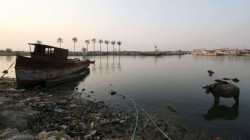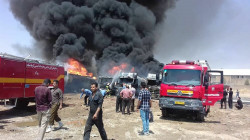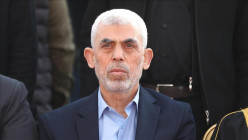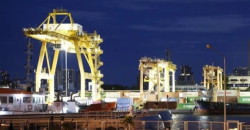In Satellite Images and Video, Hidden Clues About an Iranian Air Force Upgrade
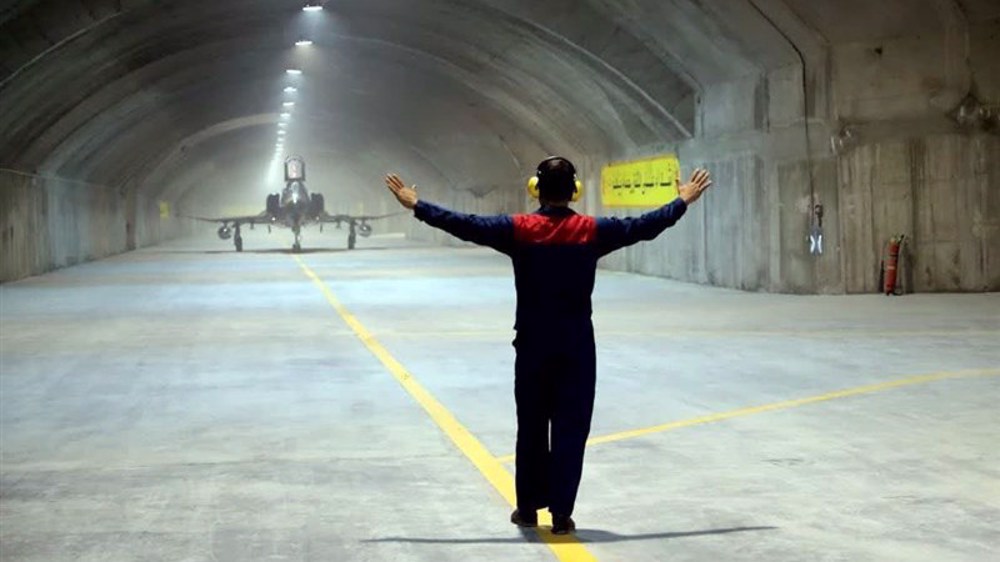
Shafaq News/ On Feb. 7, Iran unveiled a new underground Air Force base called “Eagle 44” in a slick propaganda video. On the wall was a clue hiding in plain sight: a poster with silhouettes of fighter jets. One in particular stands out. It’s situated front and center, and is in the shape of a state-of-the-art military jet that Iran currently doesn’t possess, but which officials claim Russia is in the process of selling to them.
Satellite imagery analysis also reveals what appears to be an at-scale model — what experts call a mockup — of the same type of fighter jet at the base. Combined, the details suggest two things about Iran’s plans: Officials are optimistic about the delivery of these planes, and they could be intending to use this air base to house some of them.
Since September 2022, Iranian military and political officials have publicly touted the supposed purchase of 24 Su-35s, one of Russia’s most advanced combat aircraft.
Russia has not confirmed the deal, but the details in the video and satellite images suggest Iran is at least making preparations for the arrival of the planes, which officials maintain will happen later this year. It would be the country’s most significant upgrade to its aging fighter jet fleet in decades.
Military cooperation between Russia and Iran has been accelerated by Russia’s international isolation and need for military supplies following its invasion of Ukraine.
The Biden administration has described the closer ties as “harmful,” and said it believes the Iranians are already receiving training on the new aircraft. John Kirby, a White House spokesman, said at a December news briefing that “these fighter planes would significantly strengthen Iran’s Air Force relative to its regional neighbors.”
Chris Biggers is a former U.S. government imagery analyst and senior director for Mission Applications at HawkEye 360, a firm that tracks radio frequency emissions around the world. In his analysis of the base, which he provided to The Times’s Visual Investigations team, Mr. Biggers identified two mockups of combat aircraft, including one that matches the dimensions of a Russian Su-35, in a construction staging area. “These are likely being used in assessing clearances for maneuvering the aircraft throughout the underground facility and could suggest they’ll be based here,” Mr. Biggers wrote.
The other aircraft mockup is one that is currently in the Iranian Air Force’s inventory. “The Su-35 is not, but is expected in early 2023 as Tehran continues to support Russia’s war in Ukraine,“ Mr. Biggers added.
Both of the likely mockups appeared at their current location in January while construction on the base was still ongoing. They have not been moved since, according to satellite images reviewed by The Times. The air base may still be undergoing some upgrades in preparation for the possible delivery. An existing tunnel entrance seen in the video footage may be too narrow to accommodate the wide Russian jets. But The Times’s analysis of the site shows that another tunnel, perhaps for larger planes, is still under construction.
The Iranian propaganda video assessed by The Times and Mr. Biggers was part of a trove of promotional releases about Eagle 44 put out by Iran last week. It shows high-ranking military officials taking a tour of the base.
The silhouette of the main fighter aircraft seen on a poster in the video matches a so-called flanker series jet — a term describing modern Russian fighter jets such as the Su-35, said Mr. Biggers. Iran currently does not have aircraft from that series. The other silhouettes pictured are of existing — and older — planes in Iran’s inventory.
Ukraine war brings closer military cooperation
Following battlefield setbacks, Russia has turned increasingly to Iran for military supplies, including drones that are often used to conduct attacks against large cities such as Kyiv. The sale of the Su-35s could be a way of returning the favor.
“Iran’s support to Russia in Ukraine appears to be part of a larger defense cooperation pact,” Dr. Afshon Ostovar, associate professor of national security affairs at the Naval Postgraduate School, told The Times. “Iran could benefit from Russian cooperation and weapons transfers in a number of ways, but the two primary areas where cooperation could be a boost to Iran would be through transfers of Russia’s advanced aircraft and anti-air systems, such as S-400.”
Dr. Ostovar said the new underground facility could be an effective investment in building out hardened defenses, but might be overkill for simply housing Iran’s current fleet of Cold War-era U.S. and Russian aircraft.
“I’d liken it to a brand new, really fancy garage for grandpa’s old Trans Am,” Dr. Ostovar said. “Were Iran to procure more advanced air platforms from Russia, as has been rumored as part of Iran’s support to Russia in Ukraine, or from China sometime down the road, then the underground base would make more sense.”
Ten years in the making
The Air Force base is in a mountainous area in Iran’s southern Hormozgan Province, only 100 miles north of the Strait of Hormuz, a strategic waterway that is crucial for global oil supply.
A Times review of historical satellite imagery of the area found that activity started in August 2013, with excavation work on the underground facility visible by early 2014. As of February 2023, five tunnel entrances leading to the underground shelters were visible.
It is unclear if the intended use of the underground facility has always been for an Air Force base. Construction of the airstrip didn’t begin until May 2021, almost eight years after the first observed activity at the site, and is ongoing.
Source: The Newyork Times
